How this casino addict came back from the brink after nearly losing it all
by Heather Robinson

From The New York Post
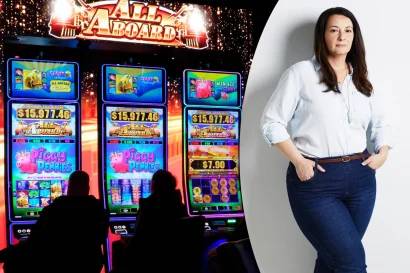
Stress led Christina Cook to find refuge in slot machines. Now, she’s trying to help others seeking recovery. NY Post photo composite
Christina Cook had never heard of gambling addiction. But she was already on her way to being hooked — eventually losing nearly half a million dollars and, almost, her own life.
In 2007, at 28, the Tulsa, Okla., native was separated from her first husband, grieving the death of her beloved grandmother and living at home with her mother.
Then her mom, with whom she is very close, had a heart attack.
After rushing her to the hospital, “I went home to get her pajamas and stuff to make her comfy” recalled Cook, now 43. On her way back, feeling “emotionally taxed,” Cook took a detour — to Osage Nation Casino in Sand Springs, outside Tulsa. The flashing lights, friendly faces and anticipation of a jackpot gave her a jolt of relief from stress.
“I sat down at a slot machine and won a $1,201 jackpot,” Cook recalled. “My sister was calling me saying, ‘Where’s Mom’s stuff?’ But it was such a high.”
Feeling shame mingled with euphoria, Cook returned to the hospital with her mother’s things. “They were all mad, asking me, ‘Where have you been?’” she recalled.
“That is when it all started to be a secret.”
Gambling would become Cook’s escape from her struggles with cervical cancer, a hysterectomy and grief that came from knowing she would never be a biological mother.
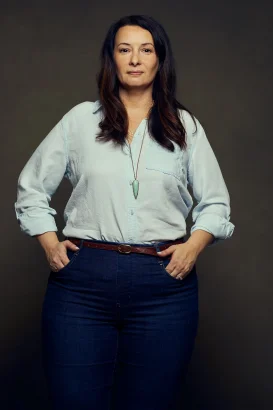
Christina Cook turned to gambling after a series of misfortunes in her life. Adam Murphy for NY Post
“My friends all had babies,” she remembered. “I didn’t want to listen to talk about showers and feedings, so I started going gambling Friday nights.”
During years of intensifying addiction from 2008 to 2015, Cook, a lifelong “people pleaser,” became romantically involved with her boss, whom she describes as a “narcissist.”
“He would tell me we were going out and then ghost me,” she recalled. “He always wanted to meet late at night. He was all about control, and he kept me feeling low, like I couldn’t look good enough or get anything right.”
She remembers being at a work auction where “they were selling slices of strawberry cake,” her favorite kind. It happened to be her birthday and she told her boyfriend she was going to get a piece.
“He said, ‘You don’t need that,’” she remembered. “But I got a slice anyway.” Her boyfriend looked at her with disgust, refusing to sit with her for the rest of the night.

Cook’s favorite form of gambling was slot machines. AP
“He did everything in his power to isolate me which, looking back, made it easier for the addiction to do the same,” Cook said. “Those machines had no expectations of me. I just had to feed them to feel good.”
Her gambling addiction worsened in the years she was with her toxic lover, who refused to meet her family.
In the early years of her gambling addiction, Cook would often sit down at a slot machine (her game of choice) and “hit.”
She would bet a significant portion of her paycheck, about $300, on paydays.
At first, she had luck. “Some nights it seemed like I was absolutely on fire,” she recalled. “Every machine I sat at, I won. People were screaming, ‘You’re so lucky!’ and I started thinking, ‘Maybe I am.’”
But she wound up pouring her winnings — and then some — back into the slots. “The last few years it didn’t matter what I won, I wouldn’t leave with it.”

Cook would win thousands of dollars on slots and then reinvest it and lose it all plus more of her own money. Alamy
The most she ever lost in one day was about $17,000.
“I had started out with $300,” she said. At one point, she had won $16,000 and $5,000 jackpots. “I remember a casino worker saying, “You’re going home with this, right?”
She played it back in.
“I walked out with $4,000 of the $21,000 I had won. I took the $4,000 back the next day and lost it plus $2,000 of my own money.”
In all, from 2008 to 2021, Cook estimates that she lost half a million dollars gambling.
She borrowed from her mother and her sister in those years — money she has yet to fully repay.
Her relationship with her twin, Michelle, became strained because Michelle co-signed a car loan for her and Cook fell behind on the payments. “We had always helped each other … and then I did that,” she said. “She couldn’t trust me. Though she never once made me feel like she wouldn’t be there for me.
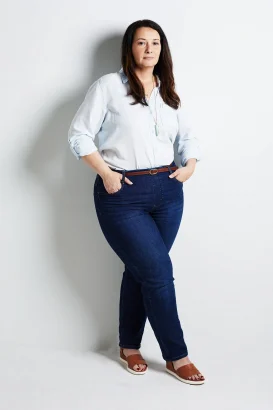
Cook said she started to borrow money from loved ones, lying to them and hiding her trips to gamble, leading to strained relationships. Adam Murphy for NY Post
“The last tally of what I borrowed from my mom was $8,000 and from Michelle, $5,000,” she said. “The real numbers are probably higher. I would say, ‘My car’s broken down’ — for the fifth time — or ‘Someone stole my wallet.’ Once, my mom said, ‘You should win an Oscar because these lies are getting more outrageous.’”
She also owed $35,000 in back taxes, $15,000 in credit card debt, $7,000 in medical debt, and $3,000 in miscellaneous debt.
Her mother tried to persuade her to get help. “She told me she wanted to be there for me when I hit rock bottom,” Cook recalled.
But Cook was in denial, characterizing her gambling addiction as “financial problems.”
She ended her toxic relationship and met a “nice easygoing guy” on PlentyofFish.com in 2015. He got along with her friends and family. They got married. His acceptance, and kindness, were especially attractive qualities after her previous relationship; however, she was still an addict leading a double life.
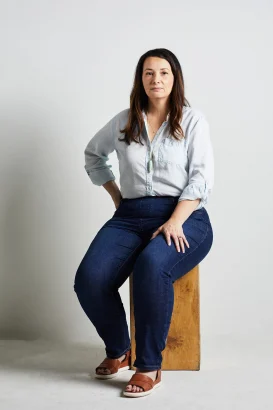
At first, she had luck. “Some nights it seemed like I was absolutely on fire,” she recalled. “Every machine I sat at, I won. People were screaming, ‘You’re so lucky!’ and I started thinking, ‘Maybe I am.’” Adam Murphy for NY Post
“He didn’t question why we never hung out on Friday nights,” she said.
In January 2021, “crippled” by debt and anxiety, Cook quit gambling cold turkey.
She didn’t hit bottom, however, until March 6.
“I had a bad day at work,” she said. “I blew my whole paycheck, my husband’s paycheck, and everything we had saved in the bank. I placed my last bet just after midnight.
“After I left the casino the morning of March 6, I couldn’t see a way out and I was thinking of ways I could end my life so I wouldn’t be such a burden to the people in my life,” said Cook. “There’s a big bridge that goes from the casino to my home. I was thinking, ‘Can I drive off it?’
“I didn’t really want to end my life, I wanted to end the addiction that had become my life.
“I felt, ‘I’ll never be cured, I’ll keep ruining my life, my family’s life,’” she said.
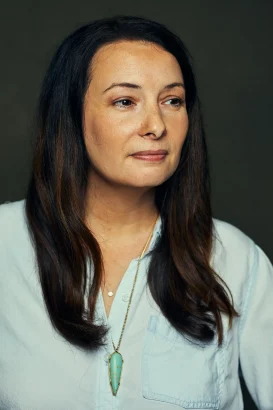
She’s now in recovery and has started a support group and podcast. Adam Murphy for NY Post
She went to see her mother the next day, handing her the 1099s she’d received from the casino for $5,000 she had won, then lost. (In the U.S., gamblers receive a 1099 for any winnings over $1200 even if they subsequently lose it).
“My mother was happy because she thought I was there to pay her back,” Cook remembered. “I broke down when I saw the disappointed look on her face.”
At her mother’s suggestion, she contacted Gamblers Anonymous (GA). One of the volunteers “took time … to give me hope,” she said.
She placed [her] last bet on March 6, 2021 and regularly been attending GA meetings, as well as weekly therapy sessions, and joined support groups on social media. Finding few resources for women with gambling addiction, she “decided to recover out loud” by “sharing [her] journey and other women’s stories” on her podcast, “The Broke Girl Society” and starting a Broke Girl Society support group.
Cook also broadcasts a YouTube show with fellow recovered addict Brian Hatch, “The Bet Free Life.” She has come clean to her husband.

Cook estimates she blew as much as $500,000. Alamy
In her search for resources to help others, she reached out to Gamban.com, a company providing software to block online gambling sites. It’s a resource she recommends as a “good tool” for people struggling with online gambling addiction, which is on the rise.
She wants compulsive gamblers, including women, to know that help and recovery are available.
“Once you’re honest, there’s no guarantee people won’t abandon you, but there is help,” she said. “It’s about building a life you don’t need to escape from.”
Resources for help with gambling addiction: National Council on Problem Gambling hotline (1-800-522-4700); Gamblers In Recovery; RecoveryRoadOnline.com; GamblersAnonymous.org and, for online gamblers, Gamban.com.
This entry was written by Heather Robinson and posted on May 7, 2022 at 6:07 pm and filed under Features. permalink. Follow any comments here with the RSS feed for this post. Keywords: . Post a comment or leave a trackback: Trackback URL. */?>



